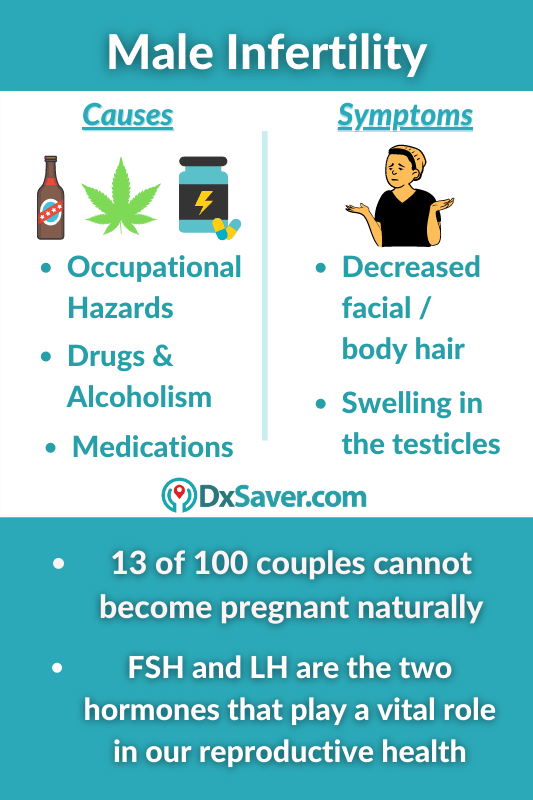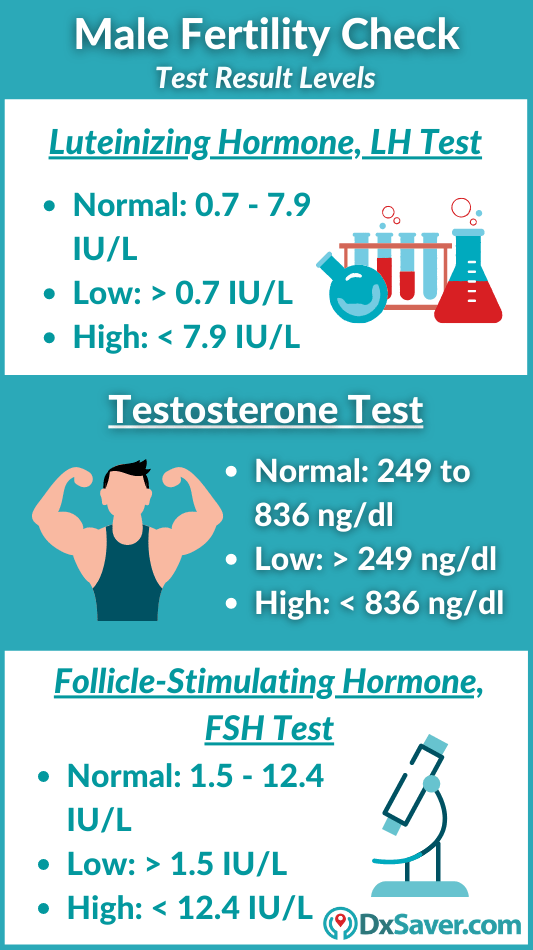
Infertility is a state where men/women or both sexes are unable to reproduce. According to the National Center for Biotechnology Information (NCBI), there are 116 million men (at a reproductive age group, 15 – 60 years) in North America and nearly 10.9 million men, about 9.4% men are reportedly unable to conceive their female partner. Infertility is becoming a serious issue around the globe. Due to recent advancements in fertility testing like hormone tests and IVF procedures, more couples are able to get pregnant and adopt a child.
- Male Fertility Test Cost
- What is the Male Fertility Test?
- What are the Causes of Male Infertility?
- Symptoms of Male Infertility
- How to Test for Male Fertility?
- Is there any Preparation Required before the Test?
- What does the Male Fertility Test mean?
- What is the Treatment for Infertility in Men?
- How to Prevent Male Infertility?
- Providers Locations
For our readers, who are very much interested in knowing the Male Fertility test cost beforehand, we would like to begin with that section.
Male Fertility Test Cost (FSH & LH)
Male Fertility Hormone (FSH & LH) test cost ranges between $59 and $88 in different labs and facilities across the U.S. No prior appointment is required. Compare the price, order your test online and visit the nearest lab during lab business hours. Complete the procedure and get the results in your email in 2 to 3 business days.
The following table shows the Male Fertility Hormone (FSH & LH) test cost at 2 of our partner laboratories (CLIA – Certified) network located across the U.S.
Name of our Partner Labs | Book Online |
HealthLabs
| Offer Price$59 |
Personal Testing Lab
| Offer Price$88 |
Male Fertility Test Cost (Testosterone)
This test measures the total testosterone that is attached to the proteins and the free testosterone (freely circulating). The total testosterone test cost ranges between $49 and $60 in different labs and facilities across the U.S.
The following table shows the total testosterone test cost at 2 of our partner laboratories (CLIA – Certified) network located across the U.S.
Name of our Partner Labs | Book Online |
HealthLabs
| Offer Price$49 |
Personal Testing Lab
| Offer Price$60 |
View Testosterone at-Home Test Kit Cost here.
Male Fertility Hormone Test Cost with Insurance
Most of the health insurance policies in the U.S. cover the cost of the Male Fertility Hormone test. However, the coverage offered by private health insurance companies and national health insurance programs like Medicare and Medicaid might vary. So we recommend you to check the coverage of your health insurance plan before getting tested for Celiac disease.
Our Male Fertility testing providers do not accept any kind of health insurance plan. But, if the insurance company accepts to reimburse the cost, they can provide you with an itemized receipt containing all the details like the name and code of the test, and the CPT code that is necessary for insurance reimbursement purposes.
What is the Male Fertility Test?
Nearly 13 out of 100 couples cannot become pregnant naturally, even with unprotected sex. Infertility in men & women occurs due to various reasons, both biological and a consequence of lifestyle habits. In over 1/3rd of total infertility cases, it is the masculine gender responsible for not being able to make his partner pregnant. The problem lies with either sperm production (hormonal imbalances) or sperm delivery (erectile dysfunction & more) or both the scenario will be the reason contributing to the male’s infertility.
The reproductive hormones in men like the Testosterone, Follicle Stimulating Hormone (FSH) & Luteinizing Hormone (LH) play a vital in making, storing, and transporting the sperm. Chemicals, which are also termed as hormones are responsible for a healthy and natural pregnancy. Sperm need to be healthy to travel from testicles and fertilization happens only when the genes, hormone levels, and environmental conditions are right.
In both men and women, the FSH and LH are the two hormones that play a vital role in our reproductive health. These hormones are also called gonadotropins, as they stimulate the gonads, ovaries in women, and testicles in men. FSH and LH hormones are the most important gonadotropins. Gonadotropins are hormones released by the anterior pituitary to increase the production of sex hormones and stimulate the production of either sperm or eggs. Gonadotropins are used in fertility treatment to increase sperm count in men and mature follicles and ovulation induction in women.
A male fertility test may include an examination of the individual’s medical history, physical examination, hormone testing & semen analysis. These tests help to assess the current stand of the person’s reproductive health.
What are the Causes of Male Infertility?
1) Hormonal Imbalance
One of the major causes of male infertility is hormonal imbalance. In this case, the male sex hormone testosterone, and fertility hormones FSH & LH are not secreted to the minimal quantity to suffice the pregnancy. Low secretion or no secretion of these hormones can be a result of various following reasons –
- Family History of Infertility/Birth Defects: If any of your close blood relations, like mother, father, sister, brother, or cousins had a problem in conceiving or did not have a child for long years even with unprotected sex, then it’s is a biological inheritance from your ancestors of having fertility issues.
- Occupational Hazards: If you had a good fertility score after puberty but experienced low fertility levels or other disorders like erectile dysfunction over the years, it may be a consequence of your exposure to hazardous substances or the environment at your workplace. Like working in a mining field, where you have exposure to heavy metals like mercury, cadmium, etc. which can be harmful to your health and fertility. Or, working at telecom/radar companies field site, where you have exposure to a tremendous amount of radiations that can have an adverse impact on your fertility.
- Medications: If you have been sick with a major disease or taking long-term medication, the drugs can influence the hormone levels and change sperm production, function, and delivery. Drugs given to health problems that can cause male infertility include –
– Arthritis
– Depression
– Digestive problems
– Infections
– High blood pressure
– Cancer
2) Lifestyle Habits
Men who have regular lifestyle habits like the following may be a cause for male infertility. The signs usually do not show up initially, but the habits start to deteriorate the fertility in men without noticeable symptoms, if the habits are continued for years, men will potentially lose the ability to conceive his partner with unprotected sex. Following are some lifestyle habits that cause infertility in men –
- Drug Use: Taking anabolic drugs and illegal drugs like cocaine and marijuana can cause the testicles to shrink and cause male infertility.
- Alcohol: Drinking alcohol in large quantities or every day consuming can lower testosterone levels, and lead to fertility problems like erectile dysfunction.
- Tobacco Smoking: Both smoking and secondhand smoking causes infertility in men.
- Emotional Stress: Prolonged stress can result in hormonal imbalance including fertility hormones, leading to male infertility.
- Depression: If a male partner is submerged in depression over his life, then the likelihood of pregnancy is lower in that couple. Depressed men also experience sexual dysfunction due to reduced libido, erectile dysfunction, or delayed ejaculation.
- Over Weight: Overweight is one of the common causes of male infertility. Obesity can have an adverse effect on health including reproductive health.
- Elevating the Testicles Temperature: Increasing the temperature of the testicles by sitting for a long period, wearing tight clothing, working on a laptop computer for a long stretch may affect sperm health and cause male infertility. Also, frequent use of hot tubs can temporarily impair your sperm count.
3) Celiac Disease
A digestive disorder caused by sensitivity to gluten, celiac disease can cause male infertility. Fertility may improve after adopting a gluten-free diet. Studies also show women having gluten intolerance and consuming a gluten diet during pregnancy can increase the risk of repeated miscarriages and premature deliveries and impaired fetal growth with reduced birth weight.
4) Immunologic Infertility
Immunologic infertility is a situation where a man’s body produces antibodies that kill or attacks his own sperm. These antibodies do not naturally secrete as killing the body’s own produced sperm is not likely to be in the human anatomy functioning. These antibodies are secreted because of a change in the hormonal functioning due to some injury/infection or surgery. However, this is not a common cause of male infertility.
5) Obstructions
Obstructions are nothing but physical barrier acting as a wall for the sperm to come out, leading to low fertility results. This can be a result of surgery, or swelling due to an injury. With a blockage, sperm from the testicles are unable to move out of the body. This malfunction results in sperm’s inability to swim or keep sperm from moving/working as in a usual scenario.

Symptoms of Male InFertility
Any damages to the reproductive system or biological traits of infertility problems will be the cause of male infertility. Some men are born with good fertility traits and very much masculine with a good patch-free beard and robust physique, but they can also encounter low fertility levels due to the lifestyle habits or choices they make. Habits like drinking alcohol, smoking, taking certain medications, and steroids can result in male infertility. Long-term sickness like kidney failure, or Tuberculosis, and childhood infections like mumps can also be one of the causes.
Symptoms of male infertility include –
- Decreased facial or body hair: Facial hairs are signs of male sex hormone, testosterone, and other chromosomal hormones functioning fully. If you experience decreased facial or body hair, it might be a signal of low fertility.
- Changes in sexual desire: This is usually seen in men above the age of 40. Post 40 years of age, the male sex hormone, testosterone, and fertility hormones like FSH & LH secretion are beginning to slow down. Thus, conceiving his partner a baby post-40 is not a likelihood of easy pregnancy.
- Pain, lump, or swelling in the testicles: Any injury to the testicles or other reproductive parts during a car crash or accidents or sports injury can cause infertility in men.
- Problems with erections and ejaculation: Issues with erections and small, firm testicles are often related to old age or hormonal imbalances that are not allowing the men to get her partner pregnant.
How to Check for Male Fertility Test?
Follicle-stimulating hormone (FSH) and luteinizing hormone (LH) are produced by the pituitary gland. Together, they play an important role in reproductive wellbeing and fertility by helping the body develop eggs (in women) and sperm (in men).
Men who have a low sperm count, low muscle mass, or decreased sex drive, can take the test. This combined test measures the levels of FSH and LH in the blood. In men, FSH stimulates the production of sperm. Luteinizing hormone (LH) is produced by the pituitary gland.
The most common way of assessing male fertility is to take fertility hormonal profiling (FSH, LH & testosterone). Sometimes, physical analysis and semen analysis may be prescribed.
What does the Male Fertility Test mean?
Luteinizing Hormone, LH Test
If your LH Test report shows normal levels, which is between 0.7 and 7.9 IU/L (international units per liter) for those between the ages of 20 and 70; and, between 3.1 and 34.0 for men above the age of 70 years, it depicts that you LH hormone if functioning completely fine and you are not in the fault of any male infertility.
Low levels of LH in men can be a cause of –
- Low testosterone levels,
- Sexual dysfunction,
- Lack of libido, and
- Fatigue.
High levels of LH in men can be a cause of –
- Primary testicular failure,
- Chromosomal abnormalities,
- Gonad development failure,
- Viral infections like mumps,
- Autoimmune disorders,
- Germ cell tumors,
- Exposed to radiation, and
- Trauma
Read more about LH testing here.
Follicle-Stimulating Hormone, FSH Test
Follicle-stimulating hormone levels vary according to age and gender. Women have different FSH levels than men. If your FSH Test report shows normal levels which is between 0 – 5.0 IU/L (international units per liter) before puberty, or 0.3 – 10.0 IU/L during puberty, or between 1.5 – 12.4 IU/L in adulthood, then your masculine fertility levels are running normally.
Low levels of FSH in men can be a cause of –
- Malfunctioning of the pituitary gland or the hypothalamus as they are not secreting enough hormones needed for the proper functioning of the body
High levels of FSH in men can be a cause of –
- Testicles are not properly functioning (advanced aging that is referred to as male menopause.)
- Gene problems,
- Tumors in the pituitary gland.
- Testicular damages,
- Exposure to Radiation,
- Alcoholism,
- Chemotherapy, and
- A side-effect of prior/current hormonal treatment.
Read more about FSH testing here.
Testosterone Test
Testosterone is the main sex hormone in men responsible for various masculine physical characteristics like facial and body hair, penile growth, sperm production, and robust muscle built.
Normal testosterone levels in men:
- Age 19 to 49 – 249 to 836 ng/dl (nanograms per deciliter)
- Age 50 and older – 193 to 740 ng/dl
Low levels of testosterone in men can be a cause of –
- Aging,
- Alcohol abuse,
- Cirrhosis of the liver,
- Chronic renal (kidney) failure,
- Chemotherapy for cancer,
- HIV/AIDS,
- Medications, and steroids (such as prednisone),
- Obesity,
- Pubertal delay
- Radiation exposure,
- Injury,
- Severe primary hypothyroidism,
- Too much secretion of Estrogen (usually due to diet habits), and
- Uncontrolled type 2 diabetes mellitus
High levels of testosterone in men can be a cause of –
- Acne
- Anabolic steroids use
- Aggression
- Early puberty, in young men
- Too much growth of body hairiness
- High blood pressure
- High red blood cell count
- Tumors (Adrenal & testicular tumors may cause abnormally high testosterone.)
- Testosterone supplementation
Read more about Testosterone testing here.

What is the Treatment for Male Infertility?
- Hormone treatments and medications: The only go for treating male infertility is taking medications that influence fertility hormones and help secrete more hormones into the blood for better sexual health and fertility.
- Treatments for sexual intercourse problems: In the case of erectile dysfunction or other physical imbalances, medications and treatments can help recover the sex drive and resolve male infertility issues.
- Surgery: Some men have male infertility issues with no sperm present in the ejaculate, minor surgeries are done to extract the sperm from testicles and use it to inject into his female partner’s egg for fertilization.
- Assisted reproductive technology (ART): ART treatments are done when sperm is present in the ejaculate but the sperm is not healthy enough to swim through and penetrate the egg, or retrieving the sperm via normal ejaculation, surgical extraction, or from donors as the case may be. Then the sperm is then injected into the female partner’s genital tract to perform in vitro fertilization (IVF).
- Avoid the use of lubricants. Products such as Astroglide or K-Y jelly, lotions, and saliva might impair sperm movement and function. Ask your doctor about sperm-safe lubricants.
- Treating infections: Urinary Tract Infection (UTI) and other sexually transmitted diseases may cause infection. Antibiotics might cure the infection that occurred in the reproductive tract, which can help to treat male infertility.
How to Prevent Male Infertility?
Most male infertility problems aren’t preventable. However, you can abstain from some known causes of male infertility by reverting to a healthy lifestyle habit. For example:
- Quit smoking.
- Limit or quit alcohol as a whole.
- Avoid taking anabolic steroids ( taken for bodybuilding or sporting purposes) at all costs.
- Don’t inject or consume illicit drugs.
- Keep fit, avoid being overweight.
- Don’t heat up the testicles, don’t sit for a long time.
- Avoid stress. Practice stress-relieving technique if your work is strenuous.
- Avoid exposure to pesticides, heavy metals, and other toxins.
- Guard yourself against sexually transmitted infections (STIs)
- Try reducing heat stress from tight-fitting underwear
Providers Locations
The Male Fertility Blood test can be done in any of the following locations across the U.S. by visiting the nearest lab. To know the Male Fertility test cost, refer to the first section of the article.
- Alabama
- Arizona
- Arkansas
- California
- Colorado
- Connecticut
- Delaware
- Florida
- Hawaii
- Georgia
- Idaho
- Illinois
- Indiana
- Iowa
- Kansas
- Kentucky
- Louisiana
- Maine
- Michigan
- Minnesota
- Mississippi
- Missouri
- Montana
- Nebraska
- Nevada
- New Hampshire
- New Mexico
- North Carolina
- North Dakota
- Oklahoma
- Oregon
- Pennsylvania
- Puerto Rico
- South Carolina
- South Dakota
- Tennessee
- Texas
- Utah
- Vermont
- Virginia
- Washington
- West Virginia
- Wisconsin
- Wyoming
Frequently Asked Questions
Will insurance cover my testing cost?
No, insurance will not be covered in the billing. However, they will provide you a receipt for insurance reimbursement purposes.
How should I book my appointment?
You can choose the most suitable provider from above and make an appointment by following the instructions mentioned by them.
Can I cancel my lab test order?
Yes, you can cancel your lab test order anytime before your testing. A refund will be initiated after deducting the cancellation fee. However, cancellation is at the discretion of the provider.
Do the providers offer result interpretations?
Yes, a few providers may provide doctor consultation who will take you through the results and provide clarification if needed.
How do I receive my report?
To ensure your privacy, the test report will be mailed to you by the provider.
Other topics you may be interested in:-
- Creatinine Blood Test Cost in the US
- Symptoms of Genital Herpes in Women
- What is Parkinson’s Disease?
- Vitamin B12 Test Cost in the US
- STD Testing Cost in Austin
- What Types of STDs cause Dry Skin?
- Is Itching a Symptom of STD?
- What are the Symptoms of Hepatitis A?
- What is GGT, (Gamma-Glutamyl Transpeptidase) Blood Test & Why is it Done For?
- Ferritin Test, Normal Levels, Diagnosis & Treatment
- Diabetes Testing Centre Near You in the US
- D-Dimer Test, Normal Levels, Diagnosis & Treatment
- Types of STDs That Cause Mouth Sores Symptoms in Men and Women






